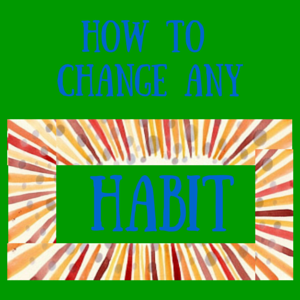
Habits are a central part of our lives. They dictate what we do and how we do it. They are patterns in our lives that impact our overall performance. While some of these patterns get noticed by everyone, there are other behind the scenes patterns that go unnoticed. Some of these behind the scenes patterns are benefactors while others are malefactors.
The bad habits are the ones that we want to break such as unproductively or an addiction. Many people try to fight the habits they want to break. Most people just try to eliminate these habits all together, but these people are fighting themselves. You can’t expect to fight the established system, your particular habit, by trying to eliminate it all together. Regardless of whether the habit is good or bad, it is the established system.
If you are unproductive, you can’t fight it by declaring you will be productive. The declaration is a start, but it’s not good enough. Instead of trying to eliminate a habit all together, you need to modify it. Modifying a habit requires knowledge of how habits work.
Modifying a habit requires knowledge of how habits work.[tweetthis twitter_handles=”@MarcGuberti” url=”http://bit.ly/1H38H0L”]Modifying a habit requires knowledge of how habits work.[/tweetthis]
In The Power Of Habit, Charles Duhigg identifies a habit as a three step process. The first step is the cue. This cue triggers an action to occur. For people who surf their Facebook feeds, seeing the Facebook app or logo is the cue. The cue leads to the routine. The routine is what you do after the cue gets received. The routine in the Facebook app example is to click on the app to get on Facebook. The routine then leads to the reward. The reward in this scenario is surfing Facebook. You may view surfing Facebook as a waste of time, and you may think that reward is the wrong word to use. However, when you are in the moment, it feels like a reward. It feels like a way to kick back and relax. Maybe at the time, surfing Facebook is a way to get out of work or find cool stuff on the web. It may not feel as rewarding when you stop surfing Facebook, but at the moment, it feels rewarding.
These habits and similar ones are the habits that we all want to change. Now that we know how habits are formed, we can change any habit with these three methods:
- Remove the cue. I used to have 10 cookies every day. I knew I would burn them all off after a nice run, but I also know those cookies made me slower. Removing the cookies from my house removed the cue.
- Change the routine. Some cues are impossible to remove. You will still encounter them. Chances are you will still use Facebook and still see the Facebook app on your smartphone. Each time you see the app, and you know you shouldn’t surf Facebook, turn off your smartphone and flip it upside down. If you think of using your desktop to access Facebook, and you know you shouldn’t, remove your access to Facebook or the WiFi all together. Mindful Browsing is a website that allows you to block any website on Safari. After you get the cue of visiting Facebook, turn Mindful Browsing (or your browser’s equivalent) into the routine. The reward will be you not surfing Facebook and getting your work done instead.
- Change the reward. Instead of surfing Facebook, use it to learn more about your niche. Look for niche-related articles on Facebook to get good blog post ideas. Moreover, if you suddenly see a reward as punishing in the moment, you may get lured away from the routine that makes the habit possible.
Many people insist on fighting habits and thinking of the whole process as a battle of epic proportions. However, most people fight habits without knowing how habits are formed. The cue, routine, and reward are the three steps that allow habits to occur. Interfering with any of these three parts of the habit allows you to interfere with the habit as a whole.
I am presenting you with the key to properly changing any habit you come across. You have the power to implement this knowledge into the habits you wish to change. Don’t think of habit changing as a fight of epic proportions. Think of it as a small change. Think of how easier it is to implement small change compared to engaging in a fight of epic proportions. The way we think of things determines how and if we get them accomplished. It takes about 66 days for a change to turn into an effortless habit. You may initially get tempted to return to old ways, but think of a 66 day countdown gradually getting closer to the 66th day. If you return to your old habit, the 66 day countdown resets itself. However, if you stay strong and don’t go back to old ways, you only have to keep it up for 66 days. Then, it will turn into a habit, and keeping it up at that point will become effortless. Changing the cue, routine, or reward to your favor will make the implementation process much easier.
What are your thoughts on changing habits? Have you recently changed one of your habits? Please share your thoughts and experiences below.
Success! You will receive your free eBook shortly.